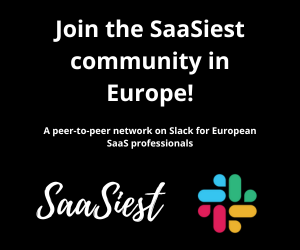We do not have commission in sales at Mentimeter. Our Enterprise sales team was formed in 2016 and never had commission. Quotas, yes. Commission, no. Nevertheless, we have a highly successful 100+ people sales team crushing their numbers month after month, and enjoying life while they do so. Our salespeople have a steady great salary with no variable.
Our approach fascinates many people within SaaS B2B. Like, how do you motivate people if not with money? How do you get them to even lift a finger? And wouldn’t it be wiser to pay people less if they deliver less like everyone else does?
Debunking the myth that Sales People are that different
I believe an underlying assumption here is interesting – that people in sales are fundamentally different from everyone else. The rest of us go to work because we believe it is interesting to solve business problems together with others. At the same time, those salespeople only want to compete, ring that bell and then get wasted on champagne. Like they do not enjoy work itself and are only in it for the money. Isn’t that strange?
Research within NeuroScience tells us that even if there might be individual differences, humans are wired more or less the same. Evolution made that happen. Those millions of years living in tribes have impacted us immensely. We have known for a while that both intrinsic and extrinsic motivators create rewards in our brains and thus make us perform. We also know that the hunt for rewards impacts our behaviour.
Meaning. You can reward a sales team in different ways. A sales leader’s job is to design the operations carefully, to reach the goals. But wait. What goals? Sales goals? Or overall business success?
You must be aware of what reward system you choose because your choice will impact people’s behaviour. And your company culture is the sum of people’s everyday behaviour. So ultimately, you need to ask yourself only one question: What company culture do I believe would make our business thrive?
As a sales leader, beware of your design
As a sales leader, you can work with both intrinsic and extrinsic motivations to make people perform.
- Extrinsic motivation – meaning people perform because they will get something at the end (more money, special rewards, end-year bonus, status recognition like being the salesperson of the month etc).
- Intrinsic motivation – meaning people engage in an activity because they find it exciting and inherently satisfying. They are motivated by learning and growth, to have the autonomy to choose their path, achieve goals together with others, and feel a greater purpose and impact (for example, the feeling of meaning when helping colleagues and customers succeed).
What’s wrong with commission, then? Well, nothing is wrong with commission or sales bonuses. It works. It makes people perform. But it also has its disadvantages.
Research guided by self-determination theory (SDT; Ryan and Deci, 2017) has found intrinsic motivation to predict enhanced learning, performance, creativity, optimal development and psychological wellness. Who would not want that?
With extrinsic rewards, on the other hand, people might feel pressured, which weakens creativity, memory, and learning. Long term, it may lead to stress and burnout.
Research also tells us that intrinsic motivation might disappear or decrease when an external reward is added to the equation. That is for sure something to watch out for.
Going back to our roots
At Mentimeter, we let our values and beliefs guide everything we do. We believe in the power of togetherness. We believe in the importance of meaningful engagement. We believe that the group outsmarts the individual.
Those beliefs are at the core of our product – The Mentimeter Audience Engagement Platform – and our company culture. Our five core values guide everything we do: Include everyone, be humble, have fun, act with a consultant mindset and work smart.
The benefits of rewarding intrinsic motivation when building our company culture correlate more with what we believe in as an organization. In the long term, we believe the benefits are higher for both the individual and the business as a whole. We think it will reinforce positive behaviour that makes us successful together.
For us, non-commission in sales is the right thing because:
- At Mentimeter, everyone works with sales
- We work smart instead of hard
- We value life balance
- We believe in learning and winning together
At Mentimeter, everyone works with sales.
With product-led growth and product-led sales as our go-to-market (bottom-up sales, where value is created inside an organization before they talk to sales and buy an enterprise plan), landing Enterprise Customers is a result of work made by product, marketing, sales and support altogether. We want a culture where we collaborate cross-functionally and make decisions that are best for the business. For example, this approach has led to joint efforts to level up our PQL, PQA and Self Service game, which might not have happened if sales were solely viewed internally as a sales business.
We work smart instead of hard.
We honour the 40-hour work week and put much effort into automating and scaling processes, doing things on a good enough level, and focusing on what will have the highest impact. We believe commission would be counterproductive since people might end up in the hamster wheel, losing the big picture and not putting time into the important but not urgent, or not building structure capital that will help others than themselves.
The pressure can also result in short-term decisions, where people sell to the wrong customer or focus on deals with less expansion potential because it makes them reach their monthly individual goal and get their commission. In our opinion, putting the “I” before the “we” is often not working smart.
We value life balance
Life happens, also for salespeople. At Mentimeter, you can go through tough times with your salary intact. We would never want anyone to down-prioritize health or family because of the stress of not hitting their targets in one month. We know that extrinsic rewards, for example commission, would increase stress and pressure. We do not want that. Instead, we believe that long-term resilience is built by having a high base salary in combination with team goals.
Learning and winning together
We believe individual sales commissions would foster a more individualistic approach, where people only care for their own goals and share less knowledge. They do not see the point of helping others or the team succeed. In the worst-case scenario, conflicts arise around lead quality and handovers. People in sales spend more time arguing about processes and lead qualifications than finding solutions on how to win together.
At Mentimeter, we spend time reflecting together, sharing knowledge and celebrating wins and learnings. Both performance and learning are on the agenda for our Quarterly Business Reviews.
What do you believe in and why?
If you are the leader of a Sales Team, you have a great responsibility. You need to think about what type of reward structure:
- That best matches the values of your company.
- Will unleash the behaviours that you believe will deliver overall business success.
Also, your decision will greatly impact what kind of sales leaders you should look for in your recruitment process and how you train and develop your leaders.
To lead with intrinsic motivation is demanding because there are no easy wins. Your leaders need to lead with vision and purpose; they need to show high trust, give autonomy, coach and develop and focus on building togetherness and relatedness.
When sticks and carrots are unavailable, leaders need to lead and not only manage.
Basically, they need to be modern leaders. Listening leaders. Engaging leaders.
That is the leadership we believe in at Mentimeter.
And that is also what we are supporting our customers with.
When we listen to our customer’s success stories, we notice a human-centred approach to leadership. Mentimeter is used in various ways, but the common denominator is the creation of meaningful engagement by responding to fundamental human needs. When leaders use Mentimeter in their training, meeting or presentation, they do things differently. They ask more questions. They listen more. They take in more input. People are being seen and heard, and their competence and perspective are recognized, valued and used.
The value that our product creates for our customers, and the way we run our own business, are deeply intertwined.
We believe in the power of togetherness. We believe that high engagement, motivation and well-being will create long-term business success. And that is why we run our Sales department without commission.




